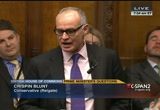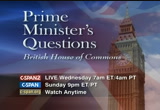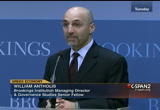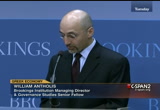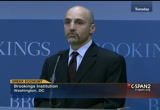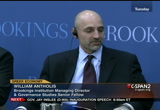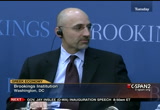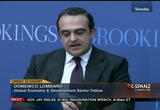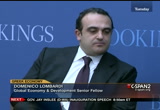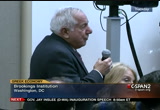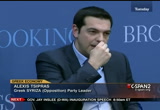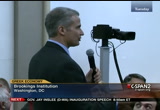tv Today in Washington CSPAN January 23, 2013 7:30am-9:00am EST
7:30 am
inviting the lord into the consequences of the united kingdom to leave the european union? >> i always, i always listen closely to what he says, and i'm a huge fan of his plans for an induction strategy. on issue of europe haven't always agreed. he was a leading proponent of britain joining the single currency and i've always been opposed to the. on issue of the referendum i gently remind my right honorable friend he was in that referendum was very much part of his manifesto of the last election. [shouting] >> in the interest of harmony i think we'll leave that to one side. >> mr. speaker, a constituent of mine with a chronic medical condition tells me that he is just 20 pounds a week to spend
7:31 am
on food and clothing after paying his utility bills, and after april after the welfare cuts in april, he will just have to pounds a day. if the prime minister police we're all in it together, with the agreed to review the impact on the very poorest of the welfare cuts so that my constituents sacrifices are in line with his own? >> i will look very close to what the honorable gentleman says and the circumstances. let me just make the point, if you compare 2013 with 2010 in terms of the level of key benefits, it is worth making this point. and unemployed person on jobseeker's allowance is getting 325 pounds more this year than in 2010. a couple jobseeker's allowance, 500 pounds more. a single out of work mother, 420 pounds more to do with the opposition try and do, week after week, is somehow paint a picture that we have unfairly cut welfare is simply not true.
7:32 am
>> order. mr. richard fuller. >> thank you, mr. speaker. health inequalities in the country are persistent and damaging and reflate the department of health announced a 5.5% increase in their allocations to local authorities for the public health responsibility, and a 10% increase. does the prime minister agree these funds directed will go a long way to help attacking long-term health inequalities because i think my right honorable friend makes an important point. for many, many years public health budgets were raised in order to to do with issues and problems in the nhs. because we put in place an increase in the in age budget, nhs budget and would also help some and public budgets were able to make sure we tackle some of the real problems, smoking, diabetes, other issues that are going to be enormous pressures on health service in the long run. >> we have heard, the house has heard the prime minister is
7:33 am
looking forward to making people from national and international banks the next few days. when will he visit a food bank? >> first of all let me once again praise what food banks do in our country, and let me point out to the honorable member that the use of food banks increased 10 times under the last labour government. >> will be prime minister join me in paying tribute to all the athletes who took part in the british -- held in my constituency? will be prime minister encourage people to register which will help us save lives of? >> i certainly could be to all those who took part in the british transplant games into the many volunteers who made these games such a success. i think gillian did a fantastic job in hosting the games. is quite right to raise this issue. they are a testament to the benefit of transplantation and i would encourage people to do as he says. >> seventy-seven of our young
7:34 am
people with the most complex special needs face being without places next year because of government cuts. why should the most vulnerable young people in my constituency pay the price for his economic failures? >> first of all let me make the point to the honorable lady that the recent were having to make cuts is because of the mess left by her government. no one wants have to make the difficult decisions we've had to make in government, but i would argue when it comes to helping the disabled, when it comes helping the most vulnerable, this government has always looked after them. >> europe was not to be saved by any single man. and then correctly when on to predict that england would save your by her example. will my right honorable friend be aware that i believe he is engaged in contradicting pit because his example today standard is passable chance of
7:35 am
resting european union for both europe and britain? >> can i thank my honorable friend for what he says. he makes an important point, which is the agenda that britain has. is not an agenda of simply saying this is what britain wants and if we don't get it we will leave. it's an agenda that is good for the whole of the european union. we face a massive competitiveness challenge from the rising countries of the south and east. we have to accept the europe at the moment is a working probably. it's adding to this is cause, adding to regulation. we need to change that. >> order. statement of parliamentary under-secretary of state -- >> here on c-span2 we will be the british house of commons now as they move onto other legislative business. you have been watching prime minister's question time aired live wednesdays at 7 a.m. eastern while parliament is in session. you can see this weeks questions and again sunday night at nine
7:36 am
eastern and pacific on c-span. >> for more information go to c-span.org and click on c-span series were prime minister's questions, plus links to international news media and legislatures around the world but you can also watch recently given going programs deal with other international issues. >> greases opposition party leader spoke at the brookings institution yesterday about his country economic crisis. this is an hour 20 minutes.
7:37 am
>> welcome, everyone. welcome to brookings. welcome to go to members of the diplomatic community. ambassador from greece, ambassador from cyprus, and ambassador from malta. and, of course, a special welcome to ambassador alexis tsipras, the u.s. ambassador to hungary. so many of you are here. i know many were here for the inauguration, the first working day of the second term. our first major event here at brookings in the second term. and yesterday president obama's second inaugural address has already called a manifesto for liberalism, bolstered his supporters on a range of issues, and his credits are already complaining he is preaching to the choir, or worse, that he
7:38 am
reaffirmed the worst feelings, that he is a socialist. and president obama anticipated that criticism by putting his talk into the context of his include ongoing skepticism of central authority, and calling it a fiction that all societies ill can be served through government alone. and as the u.s. looks around the world today, president obama highlighted a few big challenges, asia, africa, latin america and the middle east. but, frankly, americans are used to trouble in those places. but for the last three years for the first time since the end of the cold war, europe has been a major challenge. and perhaps for the first time since the end of world war ii, western europe is a major challenge. particularly the eurozone. there are many to blame for this, but certainly a spotlight has been shown on greece. greece is undergoing a debt
7:39 am
crisis but also a competitiveness crisis, and a legitimacy crisis for taxation, public spending, corruption, criminality and a general distrust of the political syst system. and in the ongoing negotiations of europe, the imf, getting through crisis after crisis after crisis. these have been three very difficult years increase. for many greeks watching the previous prime minister, was quite dramatic and that he is pledging to dismantle the state his father built. and for many in europe it is too little, too late, but forming increase it was too much too soon. unemployment, negative growth and the threat of more job cuts led to no hope. and an outcome this summer, where the socialist party increase was reduced to a tiny minimum, tiny member of
7:40 am
governing coalition that's now head by the new democracy party. and second place is the series of coalitions led by our guest today, alexis tsipras. series of, trans was as the coalition of the radical left, and in an american political context this is something entirely new for us. something that americans are trying to understand and understand what it means not just for the future of europe, but for u.s.-european relations and u.s. -- many wonder where our guests and the effect it will have on europe and on the united states. some are suggesting that greece is currently europe's achilles' heel. we will recall the great warrior achilles, a man filled with both pride and rage who was brought down by an arrow to his heel.
7:41 am
and that arrow came from paris. men in europe today wonder if it were, from someplace else in northern europe or from greece itself. so we look forward to hearing mr. tsipras' remarks but afterwards my colleague who is a senior fellow at our global economy, and i will sit with him and asking a few questions. and then we will turn to questions over to you, the audience. we will have simultaneous translation. my mother, may she rest in piece, is a greek language teacher. she will be rolling in a great asset to my own good piece on. so without i give you alexis tsipras. [applause] >> please join your piece to number two for the translation.
7:42 am
[speaking in native tongue] >> translator: i want to express our opinions, our view on the cause of the crisis, and our vision for the necessary changes that have to take place in greece. so that we can change from becoming guinea pigs of the crisis to the country that will serve as the starting point for new, progressive changes that will lead the worldwide economy to safe harbors. and so it is a special honor for me to be here at brookings. this is a foundation with strong traditions and document conversation with facts. this is a foundation that and cn
7:43 am
understand what's at stake, both in greece and in europe today. when i was young i remember those older than me telling me that if america were to catch a cold, greece would be laid up in bed with pneumonia. today, however, i hear that some of your politicians here in america are warning the u.s. government to listen to them, or else face the risk of turning into greece. there's one thing that is clear to me. our countries may be quite different, both in size and infrastructures. we also know that to our saddles and problems in the past that we would like to overcome. however, there are also bonds
7:44 am
that are very strong, which in a globalized community can become all the more stronger. because our destruction, so to speak, is your business as well. one of the things that i noticed these past few days that i've been in united states walking the streets, i had visited san francisco and, of course, washington. one of the things that i noticed is that america is a country that does not find itself in a state of depression as greece is. i've not seen any closed jobs. i haven't seen any sad faces. i haven't seen any signs of hopelessness everywhere.
7:45 am
america avoided misery after 2008. you likely played a heavy burden -- paid a heavy burden upon the crisis in 2008. our economy continue to have difficulties recovering. your doctor was -- your jobless rate is still very high. people are still worked. millions of people are still having a very difficult time making a daily living. almost all the people continue being angry with all those who are responsible causing so much pain. that you avoided misery. in contrast, greece is going through a very deep misery. i'm not talking about a deep depression and i'm talking about misery. i want to make something clear. it's very clear to us that the greek economy and the greek state apparatus have their own
7:46 am
endemic problems. these problems are structural and they have deeper roots. however, they are not responsible for causing the crisis in greece. this crisis is not something that is strictly greek. these problems did not cause the crisis. they did make it worse. allow me to say that the greek people are very hard-working. you know this by looking at the greek americans who have managed to make their lives here in the united states, and make a good life through hard work, managing through their labour's to gain, to master well. they are not lazy people as they were portrayed to be, as they were disparaged over the
7:47 am
previous years by their very own politicians. at this moment in greece, even the healthy profitable businesses are going bankrupt. young people who are highly trained with doctoral degrees from american and british universities cannot find work. why is this happening? why is there not an end to this crisis? the basic answer is that the credit system has stopped working. and instead of the government helping, it is undercutting possibilities of growth. our banks cannot lend money nor borrow. at the same time our bankrupt the government is borrowing money from europe and the imf on behalf of the banks, but these profits are going up in smoke and the black holes of the ban
7:48 am
banks. our industry and our service sectors is in a rack. and the government is now attacking and going after the already small salaries of those who are still working and trying to cover their debts. this vicious cycle is getting out of hand. government ministers privately admit that they, too, think that their policies are making the crisis worse. adding, however, that have no other options, that these are the policies, have not been chosen by them but have been imposed upon them by the european union. each time that the greek
7:49 am
government makes yet another optimistic announcement, the people compare it with the catastrophe that they see around them and lose all faith that the people who are leaving the country or governing know what they are doing. i am worried that many economists and students studying economics or public policy look at our country as a lab of political austerity. if you want to see what sort of pre-cyclical economic policies have destroyed the social web, turning a decisive into --
7:50 am
turning into a deep crisis, all you have to do is visit greece. if you want to see with what way the implementation of the greatest fiscal austerity program that is implemented in peacetime has failed to deal with the credit, with a debt crisis, just come to greece. if you want to see in what way robber barons have managed to stay in power, all you have to do is come to greece. the prevailing viewpoint is that the cycle of recession that i have described to you began because the over borrowing of the greek state during the period that came before the economic crisis of 2008. and this is not untrue.
7:51 am
from a political standpoint it doesn't help out efforts to understand the crisis. it's like saying that it's a person is suffering from cancer is in pain. this my will, in fact, be true, but this particular observation cannot help us to understand exactly what caused the cancer, what kind of cancer, this person is suffering from come and what the necessary therapy will be required for treatment your debt, like being, is a symptom of a deeper problem but if you don't believe me, that debt is not the cause of the crisis, just look at the example of ireland, or spain. the levels of the public debt, their levels of public debt in 2008 workload than those of germany. they are state deficits ran a profit in contrast to germany, which was in deficit.
7:52 am
and despite all this, ireland and spain found themselves in the same boat with greece. cutting of salaries, lowering consumption, rise in joblessness, immigration, depression. and why? the reason is that our countries are part of a poorly planned out fiscal currency union. a currency union that did two things. they took away the ability of our economies to absorb the shock in the event that we were to face a global oil regional crisis, and they managed to make the effect of the shock be much, much worse.
7:53 am
why? because during the good old days our fiscal union led to giant influx of profits from countries experiencing profits the countries that had debt. these influxes caused bubbles, which in turn led to the formation of, lead to the impression of growth and progress. in spain the money that was coming from germany and elsewhere was borrowed from private investors. the price of homes grew. people had to borrow a great deal of money from banks in order to buy homes. afterwards, prices spiked even higher. people felt all the more rich, spend more and, therefore, the spanish economy quickly developed on the back of public debt -- private debt.
7:54 am
increase, money from germany and elsewhere were borrowed from the government, which subsequently gave them to private investors to build roads, the olympic facilities, et cetera. at the same time tax evasion and tax cuts for the rich did not allow, did not allow us to have a balanced budget all previous years. and so, therefore, when the markets crash in 2008 both spain and greece were heading on the road towards disaster. in spain, just like in ireland, the housing market crashed, prices still, people ended up with homes that were worth less than their loans. many people went bankrupt.
7:55 am
when banks started having problems, the government intervened and took on its debts in this way, both banks and government went bankrupt. increase, the government directly went bankrupt because it was the one that had borrowed to a very high degree after words. the governments that had lent money to the state also went bankrupt. and afterwards investors themselves went bankrupt. very soon if the entire country had gone bankrupt. due to the structure of the euro zone where countries without a central bank behind them needed -- bailout of the banks and where the banks needed to continue lending money to bankrupt states, -- there was a
7:56 am
domino effect because of the banks that were untrustworthy and the untrustworthy countries that they were associated with. this was the point in which the european union refused to realistically look at the situation. they decided that it was better to act, that it was just a crisis of public debt, and they did not -- instead of accepting that they had a poorly designed a currency union, they decided to implement austerity packages to ponte economies that were on the brink of bankruptcy. securing their default, in this way they created a recession that was not necessary for us to
7:57 am
have. and they insisted in doing. at the cost, at great human co cost. and at a terrible cost for democracy. ladies and gentlemen, understanding here before you today, and i'm very sorry, but i'm going to say but i have to say this, none of these lessons have been taken seriously by europe. another thing that the crisis of 1929 has taught us is that if politicians fail in handling the effects of default and economic recession turns into depression, then history will punish us. and we are now facing the outcomes of the spreading of political ideologies. we now have, we are now facing the phenomenon of fascism.
7:58 am
this is taking place in greased today. increase, neo-nazis have managed to knowledge into parliament but to increase their popularity with the public. and in the parliament in my country, we are forced -- from the neo-nazi party that promote anti-semitism and give salutes just like out of hitler. and because i spoke about the period prior to world war ii, the great depression, i think it's important that we compare our central bank, the european central bank and the bank here in washington. the fact that the head of your bank, the fed, mr. ben bernanke,
7:59 am
studied the great depression for his dissertation is very important. it might be one of the reasons why the fed has behaved in such a different way than the european central bank. if somebody compares the language why mr. cranky over the past five years -- mr. bernanke by that used by the european bankers by the ecb, you will be very, you will very easily see the difference. the european central bank, our central bank, seems not to be touched at all by the economic crisis that is taking place right underneath our noses. is our central bankers have spent a little bit more of their time studying the great depression, things might have been different in europe today.
8:00 am
8:01 am
it fear about my -- fear about the left that always operated within the lines of democracy's. fear over me, and i hope i convinced you i'm not as dangerous as some people think i am. but is there really reason for somebody to be afraid of the left in greece today? i heard the person who spoke before me saying that i represent the radical left, this is a term that sometimes sounds funny to many listeners. many of you may not know that the term radical was used by many parties in greece, even former prime minister used the
8:02 am
term. radial union of greece. >> translator: how are we really radical? those who engage in scare will tell you that our party will come to power, rip up our agreement with the e.u. and take our country out of the eurozone break all of greece's ties with the culture civilized west and turn greece to a new north korea. my dear friends, this is the worst form of scare. my party doesn't want any of these things. we were always and will continue to be a european party.
8:03 am
the fact we believe that europe is lost the road, in that it is imposing inhuman policies on it's very people can be considered antieuropean. of our policies have to match the best interest of the people of europe if we were to be considering ourself proeuropean. and the fact that europe is our common home and we have to protect it from the great depression that is spreading and threatening not only use europeans but the entire world economy we want to stop the splintering of europe. that's why we're against today's austerity policies. that's why we are standing against today's european us a austerity policies.
8:04 am
i want to say it plainly, when it comes in to power. in greece wealth have one -- we'll have one and only one goal. to save the country. without allowing the people of greece to perish because a country can be destroyed when the people are destroyed, and so our goal is to save the country and keep the countried in the eurozone. this does not mean that we should accept stupid and inhuman policies that are handed down to us by today's self-destructive leaders of the eurozone. truly, in my opinion, in order for us to remain until the eurozone over the long-term, in order if the dwroans survive, we need a radical change of plan.
8:05 am
we need a racial reconsideration and review of our strategy to come cut back the crisis. not just. en on the greek level. the eurozone level. the new strategy will not come until a party like ours gains the power to say enough is enough. not just in our country but in brussels as well. enough of the craziness of austerity. what beare telling you plainly and clearly is that this agreement, this famous memorandum of understanding a memorandum of austerity, this
8:06 am
agreement is broken every day by reality i.t. what we want to renegotiate is the actual terms of lending. but the memorandum of austerity is already cut for us. it has been rejected by life itself. and allow me to stress this fact that it's not the imf's job to forecast what is going to happen . >> translator: what is going to happen if there's a political change that takes place. we can continue without the kind of observations and comments that are undercutting the stability of the economy. nevertheless, i want to hail the
8:07 am
warning to send out brussels, frankfurt, berlin, that the agreement has been already been overpassed by reality. that is impossible for it to be self-ly implemented even if they convince every greek man, woman, and child and wake up and send the entire day upholding it to a t. you see, this is an agreement that is contrary to the rules of the economy. and for this reason, the implementation to the insistence on implementing the agreement of humidity and so seated us radical policy have nothing do with the head of the eurozone.
8:08 am
and if i'm not telling you it's about reneging on our agreements with the eurozone, what then does the title "radical left" refer to? it means that we are ready for radical reforms in the government to create a steady environment of justice, redistribution of wealthy and investment. it means we're going continue insisting that the eurozone needs new foundations. it means that we are not going accept a european, the second coming of european herbert ov haunting the people of europe. it means that we're going pose every effort to explain the european crisis through the table of the cricket of the south, spend all the money that
8:09 am
was raised by the ants of the north. it means we will continue exraining -- explaining that the crisis facing the euro happened because the crickets in germany and greece had a party prior to 2008, profiting at the sake of the hard working ants in germany and in greece. and when the great recession came, the crickets of germany and greece demanded they cover their losses by taking the wealth of the ants of germany and greece. it means we're going demand a new deal for europe. a european new deal that is going to set the productive abilities of the european confidence in motion to come
8:10 am
back poverty and hopelessness -- cut back poverty and hopelessness. last june -- [inaudible] spiked from 4% to 27%. we did not place first. many of you have made -- perhaps heard the propaganda that a dangerously inexperienced party. today i stand here before you ready to answer any of your questions. while at the same time, probably declaring that yes, we are in fact, inexperienced. we are inexperienced in forming shady deals and robber barners. unexperienced in covering up standoff and payoff like the infamous seaman scandal. yes, we are inexperienced.
8:11 am
we've never signed any them memorandum that run contrary to the logic of macroeconomics. yes, our thoughts are steady, and so are our hands. above all, they are clean. the last thing i'll tell you, but not my final word, is that my message to this the audience here at brockings is that our party wants to establish a mutually beneficial dialogue with well-meaning progressive intelligent yule from your side of the atlantic ocean. i want to tell you that the people in greece, even the people from the radical left, see you as fellow travelers in multifaceted but very important undertaking to reestablish
8:12 am
wealth and growth and hope on both sides of the atlantic. the rest of the people have made great strides over the past few decades are looking at us europeans and americans withing a any. we must not let them down just like we must not let down our people. we have to prove to them that humanitarian has become wiser from the disasters it faced in the past. it has become wiser from all that it suffered in the past. all that we have -- have become lessons to us. we are not going go down the destructive roads of the past. thank you. [applause]
8:13 am
[inaudible conversations] a wide range and quite stimulating set of remarks. i appreciate very much your explaining what it means to be a radical party. to follow on that a little bit too to try to understand it a bit better. because if many americans particularly greek americans who follow greece politics closely were familiar of the -- the one that george lead for awhile. and again in the u.s. context socialist is something that is out of the question. it has a certain set about the role of government. to be to the left of that when you're radical, the deaf
8:14 am
definition of radical is to break from it. what is it from the traditional greek left that the radical left breaks from? >> >> translator: i usually answer this question by saying that every country makes its own wine, very vary in the quality and taste. greece is a country that the uniquenesses of having two large parties in the political world. what we call the democratic party and the conservative party in years past, this was the difference between the royalists and -- during the national
8:15 am
resistance, which was a great moment in greek history, the democratic side fought on the side of freedom and identified itself with the national liberation front. after the civil war, as you know. history is usually written by the victors. it's a continuation. historical analysis say that the democratic party in our country always had many different constituent seis. and following the "the dictatorship," the group was won over. and many say that he copied slogans from the radical left. today following the unfortunate choices of george and the tragic
8:16 am
past path taken by our country, this political area is now being represented by citizens, a party that does not abandon the traditions, the values, an all the beliefs from the left; however, it needs to get to the parties from the democratic side and wants to express a younger generation and the social strata that are the middle class, the poor class that are being disparaged by the economic crisis. or on the fringes of society, and unfortunately, it's a large group of the population. from this standpoint, i might
8:17 am
tell you that yes, it's true. we understand the word radical to mean breaking roots with the political establishment in greece. i can't understand why nor that the countries can have an ebbing itble tax system but we can't have one in greece. i can't understand why we can't have an effective state. we can't provide opportunities to young people. to utilize their abilities and knowledge in research and sciences. in order to help our country. yes, we want to break ties with a lot of things. with a lot of established and entrenched rational. what we want to accomplish but what we sometimes do in an unorthodox sway. the situation we're facing in our country after the five conservative years of austerity
8:18 am
and destructive policy is unorthodox. >> followup question i want to say is unorthodox and also each country has it's own form of politics and just like each country has the foreign -- politics in the street was something invested in greece thousand of years ago but still happens in greece today. and a core part of greece's economy and most strategy for growth in greece involves getting the tourist industry to become more competitive. summer after summer greece looks like it might turn around, strikes seem to slow it down. it's not just for tourists worried about airlines being canceled because of air traffic control or not being able to gate taxi but the scenes on the street. looking ahead, are you going to
8:19 am
continue with the orthodox policy of greece and calling strikes and allowing them to continue to put a tamped on -- what 0 summer tourism is like in greece. are you going to think about that differently now that you are so close to the highest ranking greek parties? >> translator: nobody should feel happy the fact they have a need to demand and go on strike and losing their ability make their wages through work instead of going on strike. focus on the strike that the effect on the economy. that's only one side of coin. we need to look at what are the things that lead large groups from greek society?
8:20 am
social forces to follow these behaviors. people need to fight because the policies that are being used the last few years are a questioning. i believe to believe the greek people have shown great maturity over the past three years in the attack against them that were implemented in the form of policies, that have destroyed what we know as middle class, policies that have destroyed things that were gained over decades. i think that strikes were the easiest most effective means for the every everyday greek to state his anger and frustrations
8:21 am
and opposition. perhaps the most democratic means, no one wants to see our country in chaos. however, with need to look at the causes that lead to these behaviors from the citizens. i recently had a discussion with a shop owner in central athens, i asked them, what do you think now that the strikes and protests have stopped in greece over the last six months. he said i like it. i asked him, if your sales increased? he said no, quite the contrary. they have gotten less. >> why? strikes and protest have lowered. he said yes, the everyday greek has gotten poorer and he can't buy things for me this means that our greatest moment is not
8:22 am
the behavior of the resistance of the greatest larger part of society, it's the policy being implemented against the people. you also spoke about tourism. i have to tell you that greece is very far behind in terms of national strategy and tourism. there are other coon -- conditions we should be starch charging tickets to enter. we are a beautiful country and we have the blessing of having the arch of pal done, and the sun and the sea, very beautiful climate. what we need is a strategic planning so that greece can utilize its advantages. not opportunistically. not for programs that aren't going give back to local
8:23 am
economies, but only benefit who build these all inclusive tourist units. you know, the guys the one that put the bracelet on the hand doesn't matter if you're in greece or nearby turkey. what is important you in a hotel with a pool. no. we need to invest in tourist programs that are going to help the everyday tourist industry and that will bring in tourists, teach them about the positive things greece has to offer. greek think, and greek ideal and provide greek economy with an influx of liquidity. >> thank you very much. right now you are leading in the polls and you are coming to the top of your polls in your country, so if you could very well be the next prime minister
8:24 am
of greece. some -- if it were to happen, you might denounce abandon the program. you said it may not necessarily be the case. and the effect you're going call yourself for a new european deal. it takes two to tang go in the way the effectivenesses of the euro strategy is going to spend a lot and whether you're going find sympathetic in berlin or brussels. if it's not successful -- if you're not going to find sympathetic ears in other european countries for this new deal, are you still going stay in the eurozone to stay in greece and in the european union. in any cases under the best possible circumstances, the greek economy is going to face higher interest rate, a stronger
8:25 am
euro exchange rate, the -- fiscal impact rating that greece has signed up to. it's very demanding economic environment how do you expect the greek economy to grow? and how you would prioritize reforms? >> translator: very critical question. there's two aspects to it. let me -- allow me to say that the first aspect is we are not asking for berlin's -- [inaudible] of course, we seek out partners and alys over the world. we see that the berlin's following is not only disasterrous for greeces but places in european economy want uncertainty and larger global economy. it may be a policy that is germany's benefit. it's a policy that places the global economy at risk.
8:26 am
that's why we're here. because i believe that we can find receptive ears and allies in our effort to not only save greece, but to overt disaster for global economy and europe. we are psychology prepared far fight. for a battle, but a you know, in life and in politics, there's no such thing as, you know, tea and crumb pets. there are interests that are con -- conflicting each other. we know our -- we know what our strong points and weak points are. we know what greece's strong and weak points. greece is one of the 17 countries in the eurozone. if greece was not in the eurozone, i have no doubt nobody would greece a second thought. they would allow the country to
8:27 am
just go on its way. just like many countries from the east were allowed to slip and fall. greece is now a to call point of the entire world interest. with a is the reason? i mean, the debt is only 3% of the european debt, and greece's gdp is small in relation to europe's. it's only 2.5%. it's one of the 17 countries -- when of the 17 links that make up the chain called eurozone. you know? if one of these links breaks, it won't only be bad for the link. it will bad for the entire chain. we know this very well, and our allies and our friends in germany know this as well.
8:28 am
the european union and the euro cannot move forward without greece. the day after a country like greece will leave the euro, the next country that will seek to leave the eurozone would be our friends and allies germany. we know this very well and they know it as well. and so it be moves us to find a mutually acceptable solutions to the benefit of europe and the european ideas. and that's why we're proposing a european solution to the european debt problem that is very similar to the solution given to germany itself at the end of world war ii in 1953, during the london conference, a series of countries, including greece, decided to allow germany
8:29 am
the opportunity to write off 60% of the public debt through growth and moratorium on payment and this is an opportunity that must be given not only to greece but the european countries that have a debt problem so that the cubs can -- countries can rediscover growth, get back on their feet again. now, the second aspect to your very important question has to deal with how this magical word known as "growth "will become a reality. we have to be specific here. we just can't talk without facts. we have to define what it means to have growth for the few.
8:30 am
in other words what we have in greece during the '90s and growth for everybody. the vision that we have. growth that will allow for a social profit. yes, greece needs social reforms. one of the biggest problems is bureaucracy. and perhaps it is even more important than the need for cheap labor, that is supposedly blocking competition and we also need get rid of these robber barons. i'll say it simply, when it comes to investment that will bring jobs to greece, there's a closed circle of international contractors that are in can
8:31 am
hoots with the government and governing the country over the last twenty years. and therefore, we believe there needs to be social justice. at the same time, we need see what specific sectors like tourism, which i mentioned earlier, but also renewable energies, greece has this capable due to the geographic call division. we can also look at quality agricultural products. it's another capability that greece has. we can look at energy on the whole. today greece is an energy hump. the inroads of the energy and roads of the 12st century run through greece today pane research, innovation, utilizing the country's scientific dynamic and potential. there's so many children that are heading out to other countries today. greece can return to the road of growth if it can overcome its
8:32 am
endemic. weaknesses and with the help of all of those who not want to take advantage of grows but truly want to help it and stablize itself in europe. >> thank you very much. just a quick followup question, if you allow me. the national agenda is that you are in -- [inaudible] in washington last month you were in brazil. and emerging economy which has been growing quite faster together with other emerging economies especially in egypt and and indonesia. and these emerging economies have been also growing so fast -- [inaudible] a number of markets reforms. which can greece learn from the
8:33 am
emerging economies? >> translator: let me begin by telling you, that the greek example has many differences compared to countries like brazil and other developing countries. however, out of all of these -- choose a few. you know, in brazil, there's over 20 million people that are leaving, of course, over ten years ago there were 45 million that lived in these. and so the government managed to get twenty -- half of them out. we in europe after the plan and the place after the war managed to overcome these problems and forming social states, which is unfortunately destroyed today due to austerity policies.
8:34 am
and so the conclusion that we can draw is that from these countries is that the policies of the austerity cannot help any country overcome the crisis under any terms. the only way to help is by helping demand, helping justly redistribute wealth can one overcome endemic problems and achieve major steps forward like brazil did in recent years. during my visit to brazil, my meeting with the president and foreign president, remember the following, there are worries over the danger of the european
8:35 am
recession being exported to other emerging countries. their worry that the european recession will even affect countries not just to go down the road of austerity. and i think that we need to pay attention to this. we have a common interest to stand up against a shortsighted vision that once saw quite -- europe divided in two. we have a common interest in advance the growth, stability, and social -- [inaudible] within the context knob can isolate a sickness to one particular country. in a global context, the illness
8:36 am
of recession can effect even a country like the -- economy like the united that is taken tremendous steps to create a policy that has been aggressively promoting demands to the public. that's what i remember from my trip there. >> we have time for a few questions from the audience. start with peter here. in the second row. [inaudible conversations] >> while spert getting the microphone. we want to give special thanks from the translater today who game on short notice. his translater was stuck in frankfurt germany in a
8:37 am
snowstorm. we're going to go a little bit slower since the trance-- trancelay -- the european economics. i would like to ask you the question with respect present government and recent past governments in greece, do you differ in any areas in foreign policy with respect particularly with respect to former yugoslavia republican of mass done ya, and turkey, and care to comment about people in greece who are encouraging closer relations with israel some because they have fallen out with turkey? but i'd like to get some idea who how you view current foreign policy in greece.
8:38 am
>> translator: i could tell you that -- is that a country doesn't have continue newty in the foreign policy. we going to come not to do a 180 and turn everything around, but able to give a multidimensional and active tone to our foreign policy. during my meeting with the u.s. ambassador, earlier this week, he told me what does it mean? what is multiidimensional and active foreign policy mean? greece is a country in europe but it's not like the other european countries. we're not lucky enough to be bordered by sweden. our borders are a hot bed.
8:39 am
a hot area in the met mediterranean basin inspect is an area that is historically has been a region where there have been attempts to assert one's claims and make attempts associated with the special geostrategic position. some of the arab spring, we have instability in the area. i told you before, it's an energy hub. we are going help the efforts to make greece a region of stability, cooperation, and we want peace and cooperation with our neighbors first and foremost. but this will depend on a mutual acceptance of the role of
8:40 am
international law. we have differences. and we believe that these have differences of -- [inaudible] we have open wounds like the cypress issue. which we believe needs to be solved for just by the help of the international community along the lines of the president. which unfortunately haven't panned out. our former relation with former using yugoslavia needs to be relations of collaboration and cooperation. have nothing to fear from a small neighboring country to our north. our difference over the name issue is a difference that needs to be solved when the context ever agreeable solution.
8:41 am
a solution that is acceptable of geographic qualifier. this is an opinion that the party has had back during the package was submitted in the early '90s. this was an opinion that he did not share what-foreign minister and what worries us in our relations with them is not so much the name, but the nationalism that is being implemented. we believe that nationalism is the greatest faux to peaceful coexistence among the countries. we're very uneasy when we see nationalistic parties place first in the neighboring country, and start withdrawing
8:42 am
iridescent thoughts and policies that were in the past. in relations to israel, we believe that our economy along the lines of multiidimensional and act of foreign policy needs to develop collaboration with israel along the lines of mutual interests. we are in favor of cultural cooperation, commercial cooperation, the ability of exchanging knowledge and know-how. we are going -- where we have some reservations as in military cooperation. it's because we consider -- we believe that our country should not run the risk of gaining new enemies. our country needs friends not enemies in order to promote
8:43 am
stability in the region, and so i can tell you that greece must develop the traditionally close ties with countries in the arab world as well. it needs to serve as the bridge between the western world and europe with countries in the arab world. and so the multidimensional act of foreign policy means despite the fact that the greece is a european country, at the same time it needs to develop bounds of froip and collaboration with a series of countries that are not in the european union. otherwise greece will be a country that follows strctly follows. -- strictly follows. the e.u. strategy and the most important countries in the european union. and so greece will not be able to serve as a bridge that has --
8:44 am
that would be able to make a greater contribution to the european union and to the western world. >> thank you. [speaking in foreign language] >> translator: that you are trying to build a profile of a responsible european party while at the same time trying to build up a rhetoric of councilling the memorandum, but if the memorandum is -- if there are alternatives to the memorandum, why have the previous greek
8:45 am
prime ministers not tried to change this? and what guarantees to the greek people have that you are not going to follow the policies that initially oppose to the memorandum and supports it? thank you. >> translator: the memorandum is in fact, a one-way street but it's a one-way street to disaster. when the one-way street you follow leads to the cliff, the only thing you can do is turn the other way. and look see what alternative roots you have follow -- not to continue and head off the cliff. we honestly believe that the memorandum and the austerity policies are what threatens
8:46 am
europe today. and our goal is, yes, we truly want to -- what is that we would be decrying? somebody that is already decried and condemned by life itself. you don't decry can divers. they decay by themselves. the memorandum has been revised twice up until today. and the reason for this is not that it was not implemented properly but because it fact was implemented and carried out. and so we're going proceed with its' what is going to come next is going to be somebody that knob wants to talk about publiclily. everybody knows what is coming. a new haircut that will follow after the german elections that will make the greek debt viable and the question is, why should
8:47 am
the greek people suffer? and should the global community live with the fear that the crisis will spread to the entire world just so that mrs. merkel can proceed with elections in germany without telling her voters that we have in fact failed. that the memorandum has failed. all of the annalists in the imf point to the fact that the new haircut is necessary. there are attempts to cover it up until we get to next september, and so in the final analysis, what is most important for us is not the political imagination that are in place in germany, but so that we can save whatever is left to save in greece and stop the tragedy that
8:48 am
is being experienced by the greek people. no. in regards to the last part of your question, i know there's a problem of credibility in the greek political world, but, you know, it's not nothing through for us. in greece we have become used to the fact that the -- one thing prior to the election a and one thing after. who promise one thing before they get elected and another thing once they come to power. as you see, we only say things we believe and we're going to try to implement. we're not saying anything that is crazy, we're not saying anything that is too wordy. in many instances we feel like scientists from the middle ages who were trying to tell everybody that reinvolves around the sun and yet we are
8:49 am
threatened with excommunications because they were talking sense. we're talking sense. we are being heading off a cliff. we're not going to be like gal lay owe and say that the earth doesn't reinvolve around the sun. >> i'm going ask a follow yes. one thing in the united states are sympathetic to the idea that austerity by itself isn't going create growth certainly that was president obama and many democrats and some republicans view of our own economy. the question they have for greece is will each round of loans lead to the right kind of investments and the right kinds of restructuring end of licensing and end of other things that constrain the greek economy and many consider the last communist economy in europe? and so i think what when they see the rise of it and hear a
8:50 am
radical left party. the question is not just how the end of austerity will bring growth, but how competitiveness will come to the greek economy. either inside or outside the eurozone, the greek economy has to become more competitive. >> translator: i am completely opposed to the view that greece was the last soviet-typed european or last comes nist economy in the europe. greece is a country from the 1990s onwards has proceeded to many programs. if you can compare greece with other european countries, you'll see that a large part and strategic part public sector has
8:51 am
now come to to the hands of the of private owners. this is a reason, or one of the reasons that all of the grandiose plans for privatization plans is what the initial title was never panned out. because there's not a lot of things left that they can privatetize today. it's a myth. it's a myth for the soviet type economy. of course, greece has some weaknesses in terms of the structure. especially in the way it bilged the public sector. it's not that the greek public sector is too large, but that it's built the wrong way. it was built -- it was built on governments assigning their crony and other people in to positions to win over votes.
8:52 am
and so we need to proceed with structurial reforms. in many instance copying models that effective in other european countries, but the solution is not to implement in greece what they did in chile and destroyed it. it's not a program of privatization of every business that might be profit generating. our program precisely because we understand the need for what economists call fdi, foreign direct investment, direct investments from foreign countries we want to follow a
8:53 am
model that is successfully implemented scandinavian countries in norway, where the public sector participates in partnership with private funds or through the international grievance bilateral international grievance that will have two points for greece nap will allow greece to create jobs and that will respect the market and respect the environment. the second point, is to secure what we call social reciprocity. i believe that we can proceed with these kinds of investmentss and they can work. on the other hand i believe that the investment that we in greece call eluded, the only investment is to generate a quick profit will not be successful and
8:54 am
contribute to the restarting of the greek economy. >> right here. yes. right here. >> thank you, bill. >> you're in washington, d.c. at the time when the capitol is focused on several foreign policies and national security crisis in greece's immediate future. there's a syrian civil war and the refugee crisis in turkey, there's the growing threat of iranian nuclear ambition with the nuclear capacity aiming toward europe, and of course the emergence of the al qaeda and islamist in libya and algeria. the united states and greece have been nato allies for sixty years. greece's defense expenditures will likely drastically reduced because of the crisis you've been describing here.
8:55 am
how do you see them contributing to the international security in the years ahead? thank you. >>if i understand you correctly how greece can contribute to europe. for a stability for -- for most stability. greece is a country that finds itself or that borders countries that are in a state of flux. it is a country that the european union and nato from our perspective is that greece needs
8:56 am
to be bridge of friendship and stability in the area. of course, greece cannot face and solve a series of issues all alone. as you mentioned earlier, which have other causes, the irrespective to greece and that harm stability not only in the region but the on worldwide scale. greece could help and contribute within the framework of the organizations to which it belongs. in order for -- in order to believe the crisis in the areas, a major issue that is of concern
8:57 am
to us in recent times what is going to happen in -- enabling there's a danger of a change of government, change of rule in syria, which some people may find quite -- may cause people to breathe a sigh of relief. syria didn't have a democratic government. it could have been worse. and end up with millions of refugees heading west, and in fact, religious refugees will be persecuted because of their beliefs. millions of christians may be fleeing syria in order survive. perhaps the first country they come across on the way west will
8:58 am
be greece. and you can appreciate how a country facing such a large scale of economic and social destruction and that is already experiencing an intense immigration problem with hundred of thousands of immigrants coming in wanting to head west but the european union is not accepting them and greece becoming a holding center for them. you realize that greece cannot handle this issue by itself without the close support, cooperation, coordinated collaboration of the international organizations to which it belongs. and the united states can play a crucial role here. perhaps this is just one aspect
8:59 am
a very small aspect of the problems that you mentioned. however, i believe that we live in an age that is changing very quickly where everything is in influx and in order for greece to play the role that it need to play in the international community needs to be able to stand on its own two feet. the drama that it is facing the past three years, not allow it to do so, and here is yet another reason to convince us to realize that something needs to change. >> unfortunately we're at the end of our time inspect has been a really fascinate -- fascinating and interesting hour and a
161 Views
IN COLLECTIONS
CSPAN2 Television Archive
Television Archive  Television Archive News Search Service
Television Archive News Search Service 
Uploaded by TV Archive on

 Live Music Archive
Live Music Archive Librivox Free Audio
Librivox Free Audio Metropolitan Museum
Metropolitan Museum Cleveland Museum of Art
Cleveland Museum of Art Internet Arcade
Internet Arcade Console Living Room
Console Living Room Books to Borrow
Books to Borrow Open Library
Open Library TV News
TV News Understanding 9/11
Understanding 9/11




